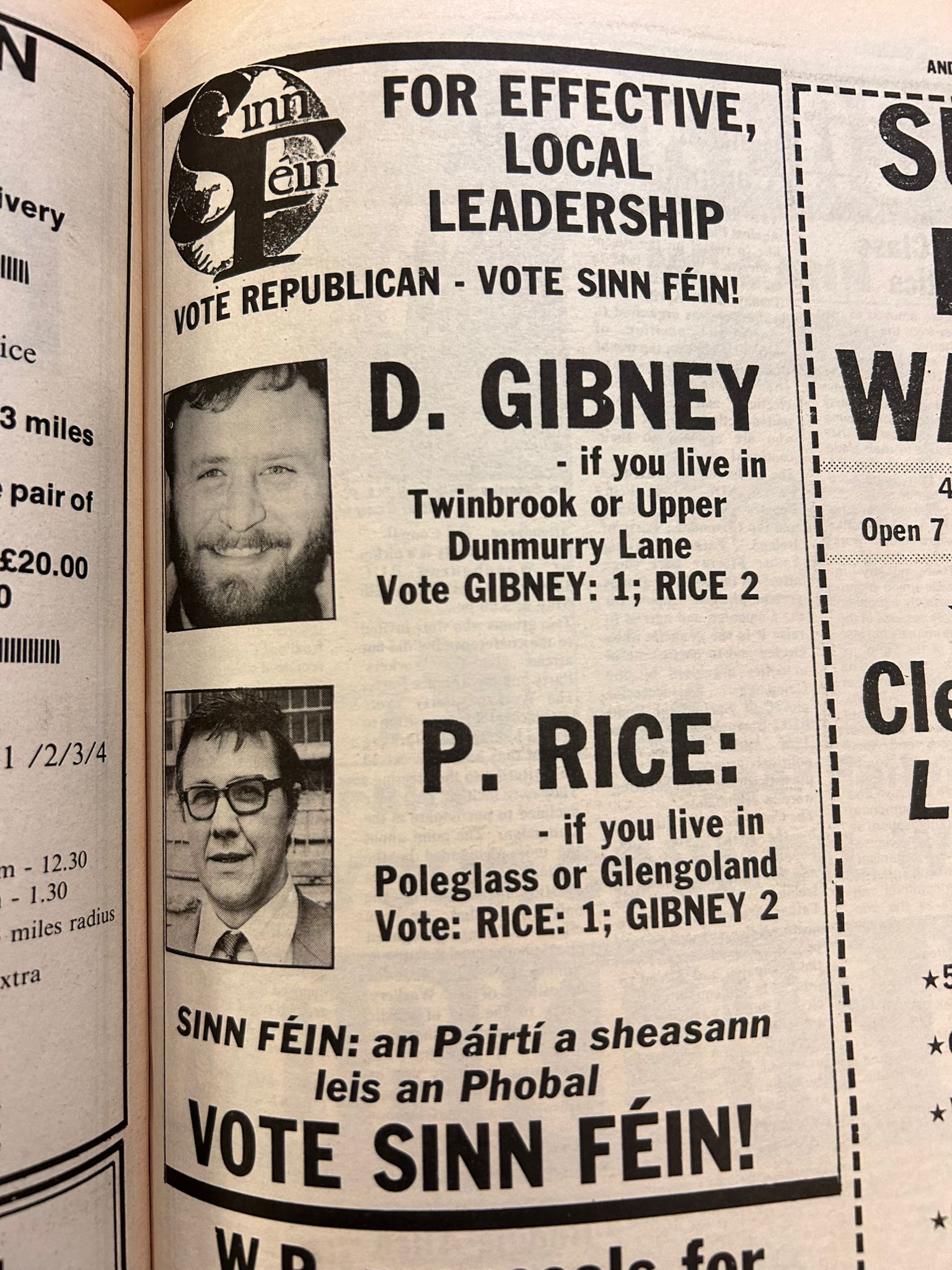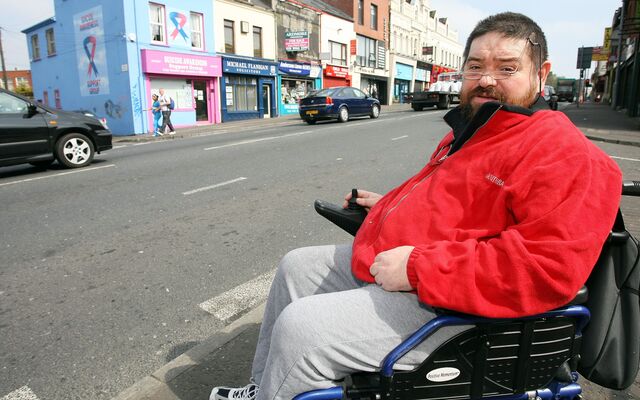Veteran republican Feilim Ó hAdhmaill, a life-long friend and comrade of Damien Gibney, has told a memorial gathering at his Riverdale home that the late Sinn Féin councillor’s life was one of unstinting service to the community and to the republican cause.
Over 100 people, including former Sinn Féin leader Gerry Adams and West Belfast MLA Pat Sheehan, attended the memorial on Monday evening. Requiem mass for Damien took place this morning from St Luke’s Church in Twinbrook.
“For me, Damien’s life was one of struggle, as well as one of service to others,” said Feilim, who worked alongside Damien in the pioneering Twinbrook Tenants and Community Association which had its funding stopped by the British government in the eighties for working with Sinn Féin representatives. “Damien was a republican activist from a very young age, a community activist who pioneered a range of important community projects in the Twinbrook area in the 1980s. He was a Sinn Féin member, at a time when it was very dangerous to be a Sinn Féin member, and one who made history, along with Pat Rice, as the first Sinn Féin members to be elected as councillors to the Unionist dominated Lisburn Borough Council in 1985.”
Damien moved to Dublin in the 1990s, following a loyalist assassination plot, where he worked with the homeless.
On his return to Belfast in the 2000s he and his wife May, a Dubliner, became involved in fostering.
Said Feilim: “He spent his life working for others and working to achieve real change in the here and now for his people. He was one of a relatively small number of his generation, who made history, and who changed the world, forever, for all of us, and for future generations.”
The pair met as teenagers in Twinbrook in the mid-seventies.
“We’d been asked to help sell Republican News in the Twinbrook area, and I realised at once that we shared a lot of similarities,” explained Feilim.
In memory of my Buddhi Damien Gibney RIP 🙏
— mindfulnessbelfast (@frank_liddy) May 5, 2023
MINDFUL MOMENT: From an acorn grew a mighty Twinbrook oak @MIUI| https://t.co/yHfmxmY5AG
“We had both arrived in Twinbrook as refugees after losing our family homes in other parts of Belfast due to unionist violence and intimidation. Damien’s family had lost two homes in this way, first in East Belfast and then, like Bobby Sands’ family, in Rathcoole in 1972. We had both decided to become involved in republican activism as teenagers, to oppose the British military occupation at the time, and unionist domination and oppression. We both shared a vision of a new Ireland, free from British rule, and reunited. And we both wanted to achieve a republic based on socialist principles, one that collectively cared for its people. In many ways, we also shared the innocence, naivety and romanticism of youth, dismissing the dangers of the path we’d chosen and believing that commitment, along with the determination and the energy of youth, was all that was needed to right the wrongs of hundreds of years and create a new more equal society.”
Feilim recalled that the new Twinbrook estate was beset with endemic problems including British military occupation and widescale joblessness.
Absolutely, add Damien Gibney to that superb list. I often think of how Micky Ferguson would be proud of all the great work done since his loss. He more than anyone instilled in me how proud we should be of our area. #RIPMick
— Michael-Angelo 🇮🇪 Mícheall Ó Labhraí Tréan (@mickymobile) May 20, 2022
Feilim added: “Twinbrook, although, at that time situated within the unionist Lisburn Borough Council area, was one of the few areas of newbuild housing in the greater West Belfast area, and many families, like Damien’s, sought refuge there, often squatting in half-built homes with no running water or electricity.
“By the early 1980s it was estimated that a majority of residents in the newer phases of Twinbrook were squatting.
“Many of the original residents in Twinbrook had come from redevelopment areas such as the Lower Falls, which by the early 1970s had become an Official IRA stronghold. Thus, in the early stages of the estate the main armed grouping in the area were the Officials, and that was to remain the case, right up until the time of the 1981 Hunger Strikes.
“The growing support for and mobilising of the Provisional IRA in the area, throughout the 1970s, was to lead to tensions, as the Officials feared losing their dominance and control. Invariably they took their frustration out on teenagers involved in the growing Provisional movement in the area, and people like Damien were often threatened and beaten up.
“The 1975 Feud between the Provisionals and Officials, was particularly bad in Twinbrook. Besides shootings between the organisations, upwards of 70 teenagers, including Damien, were forced to leave the area under threat from the Officials and a number of families lost their homes completely. But this wasn’t to deter Damien.”
Youths in Twinbrook during this same period were targeted by the British Army.
“The (British) response to IRA resistance in the area led to teenagers, in particular, being targeting for stop and search on the streets or being lifted in early morning raids for screening in Fort Monagh Barracks, accompanied by an invariable beating. Youth, sometimes as young as 14 or 15 years old were often subject to this type of abuse. House searches, roadblocks and the constant control and surveillance of the local community were a normal part of life.”
The release of Bobby Sands from Long Kesh in 1976 was to have a major impact on Damien’s life.
ANDRÉE MURPHY: Damien Gibney – an inspiration and example https://t.co/FixFm46Xur
— Andrée Murphy (@andreemurphy) May 13, 2023
“One of the most important political developments in the area, during this period, occurred when a young Bobby Sands was released from jail in March 1976,” said Feilim. “Although he only had seven months of freedom before being captured again in October of that year, he threw himself into the work of organising republicanism in the area, and more importantly, redefining what it was to be a republican.
“He promoted a wide a range of different forms of political and community work as not only being legitimate, but important and necessary forms of political activism for the overall liberation struggle. Bobby’s activism and his charismatic, down to earth, personality was to greatly inspire many young republicans in the area, to follow in his footsteps. Damien was one of them.
On a number of occasions, he was targeted by Britain’s Death squads, both at his home, which had become his advice centre in Twinbrook, and at his employment.
“During the H-Block Blanket protest, Damien was active in the local Anti-H- Block Committee.
“Bobby’s death greatly affected Damien, as it did many of us here today, and it convinced him to continue to work to achieve Bobby’s ideals.”
Bobby Sands’ commitment to community activism inspired Damien to reestablish the moribund Twinbrook Tenants’ Association.
“A new Association, the Twinbrook Tenants and Community Association was established, which was open to all over the age of 16 in the area. Damien along with others began developing a range of both innovative and pioneering community projects in the area.
"For example, along with Frank Liddy he developed the proactive Twinbrook Benefits Take Campaign and established a Welfare Rights Advice Centre in one of the changing rooms in the old Brook Activity Centre.
“The Advice Centre often had queues of people out to the door looking for advice.
“Damien was also behind the Link project – developing a partnership with statutory and voluntary agencies in trying to provide funding for local youth to divert them away from anti-social activities. At a time when the local community was often demanding punishment beatings, Damien was trying to develop more humane alternatives.
“The unionist dominated Lisburn Borough Council remained hostile to the TTCA during this period, refusing to offer funding and indeed refusing to even answer correspondence from the organisation.
TRAILBLAZERS: Election ad from the Andersonstown News in 1985
“One of the responses the British Tory Government was to blacklist and deny any funding to any community organisation it suspected of having any association with Sinn Féin members. In a place like West Belfast, that meant that many community groups were politically vetted, as it was termed.”
Undeterred by the political vetting, Damien threw his hat into the ring as a Sinn Féin candidate in the 1985 local elections to Lisburn Council.
“(Damien and Pat Rice) made history by becoming the first Sinn Féin Councillors ever to be elected to that overwhelmingly unionist council. Anyone who stood for SF in the 1980s or 1990s wasn’t doing so as a career choice. They were placing themselves on the frontline, subjected to unionist abuse, beatings, intimidation, discrimination, and targeting by Britain’s Death Squads. During the armed conflict at least 20 Sinn Féin activists and at least four immediate family members were assassinated by Britain’s Death Squads.
“That was the scenario in which Damien and Pat found themselves as newly elected councillors in Lisburn.
Ógra Shinn Féin would like to send their sympathy’s to the family of Damien Gibney who tragically passed away yesterday night
— Mairéad Farrell ÓSF - Béal Feirste (@mfograsf) May 5, 2023
Damien was a member of na Fianna Éireann, a political prisoner and a Sinn Féin Councillor
Damien was elected to Lisburn city Council in 1985 along with pic.twitter.com/71BhIrUp4J
“Damien, like Pat, suffered physical and verbal abuse and intimidation from unionists every time he attended council meetings in Lisburn and had to travel to and from such meetings in a specially armoured car for protection. On a number of occasions, he was targeted by Britain’s Death Squads, both at his home, which had become his advice centre in Twinbrook, and at his employment.”
Damien continued to be a Sinn Féin activist in Twinbrook, along with his wife May, until the early 1990s, when he and May decided to go and live in her native Dublin.
Concluded Feilim: “Damien returned to Belfast, in the 2000s where ill-health severely limited his activism. However, he continued to work for others via fostering. Damien died suddenly and unexpectedly in his house on Thursday 4th May. He is survived by his wife, May, his daughter Sinéad and son-in-law Neil.
“For me, his legacy is that he was one of the few prepared to put his head above the parapet in the 1980s and 1990s. He therefore helped to prepare the way for what hopefully will be an important day on Thursday, when Sinn Fein becomes the biggest party in local government in the north, with all the opportunities that will present for us all.
“Go ndéana Dia trócaire ar a anam dílis.”








